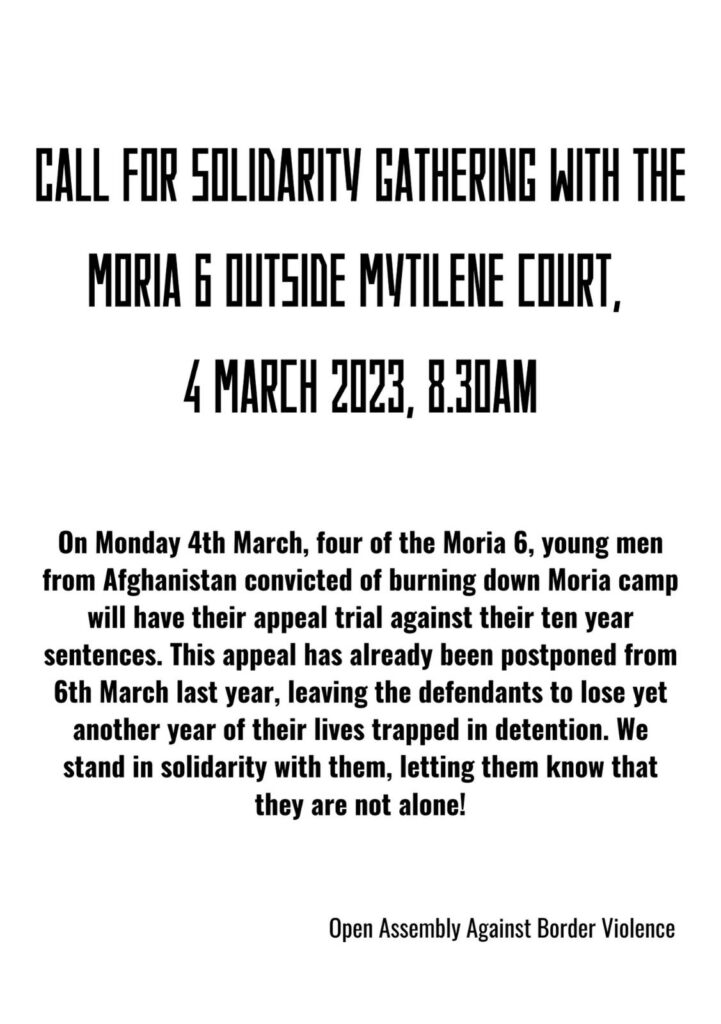On Monday 4th March, four of the Moria 6, young men from Afghanistan convicted of burning down Moria camp will have their appeal trial against their ten year sentences. This appeal has already been postponed from 6th March last year, leaving the defendants to lose yet another year of their lives trapped in detention. We stand in solidarity with them, letting them know that they are not alone!
To be clear, it is not our business to determine how Moria burned: all we want to say is that without a doubt it had to. For years the situation in the camp had been deteriorating. Originally intended for 2,800 people, the population grew until it peaked in 2019 at around 20,000. It was notorious for a lack of hygiene, lack of basic needs, rapes and stabbings. In the end, those living there had enough, and in the beginning of 2020 they came to the streets to demand better living conditions. The response was a far-right takeover of Moria village and a general acceleration of far-right violence in Lesvos. What followed was a never-ending Covid lock-down on Moria camp, giving the far-right, and the government, what they wanted – no more migrants in public space.
The people living in Moria camp felt like they had been locked up to die. The conditions of the camp were left in deliberate chaos; all the while, some among the island’s population took matters into their own hands by attacking any possible permanence in the structure that could improve conditions. After the failed attempt to build a new detention centre, which led to a reactionary backlash, the government announced plans to build a fence around Moria to contain the people more effectively. The fire came after months of demonstrations and hunger strikes inside the camp during the Covid lockdown.
The burning of Moria also put into crisis the Greek paradigm of migration management at the time. It created an opportunity for people to leave the islands, for example, the 3000 unaccompanied minors who were transferred to mainland Greece and Europe. Unfortunately, the energy released by the disorder was captured and reintegrated into a new paradigm of migrant management. Kara Tepe – a former military base with artillery and cancerous levels of lead left in the ground – controlled, surveilled, exposed to the elements. Although the population of Kara Tepe is lower than it was in Moria – due to the policy of pushbacks – the daily reality in Kara Tepe is not much different from its predecessor.
Following the new policies of excluding migrants from the general population, Vastria is under construction. Just like the other new closed camps in Greece it will be a highly surveilled camp, in the middle of a pine forest, an environmentally protected area with a high risk of wildfires, 45 minutes by car from the city. All services will be provided inside the camp, meaning the few NGOs with access will be those that declare their will to work closely with the government. With this level of surveillance, people with two rejections on their asylum claim will be trapped in the camp, and those still in the asylum procedure will likely have restricted access to the city.
No camp is a place where people should live. Camps are built to reinforce divisions between locals and migrants. Camps separate the population into citizens and non-citizens. Camps force people to live in a place that is incompatible with human life, because, according to the European model, migration should be punished and prevented.
Prosecutors will go to any lengths to protect the reputation of the nation, and they think that their role contributes to securing the borders. As with many other trials against people on the move there is no evidence. Despite this, they have already spent more than three years in prison. In the first instance trial, the prosecutor and the head judge cut short the testimonies of defense witnesses with aggressive statements. The specific prosecutor of the upcoming appeal has a proven record in racist comments leading to severe sentences for migrant people. In the context of a migrant accused of driving the boat, she asked: “Why didn’t you fly to Greece but chose to come illegally by boat? Because you wanted to come illegally!” We can imagine what kind of trial this will be.
The use of these six young men for the Greek state is to reinforce the idea of criminal men from the Muslim world, who pose a threat to ”the Greek orthodox civilization” and “the European way of life”. This prosecution is an attempt to redirect the guilt of those truly responsible for the crime of Moria onto six people who had to live through it, to remove the fire from the context of years of resistance to its existence, and to ignore the fact that Moria was hell.
In rage & solidarity
Lesvos Open Assembly Against Borderviolence

